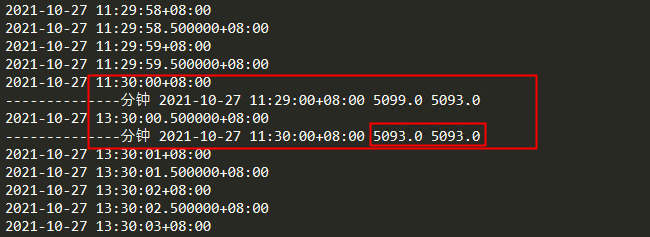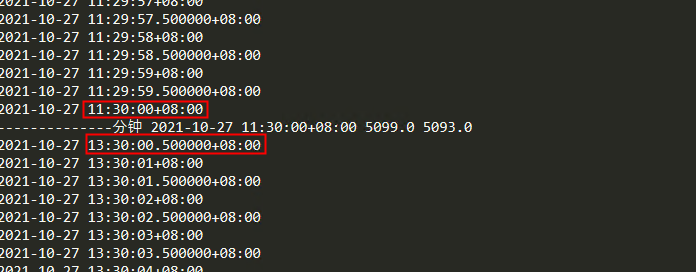BarGenerator通过tick时时行情在合成数据时发现一个问题,如下图:

就是在跨交易时间段,比如上午11:30跟下午13:30衔接时段会出现上午11:30的k到下午才推出来,但是仔细看这跟k,其实只有1根tick数据,而上午11:59:59.500000时间推送出去的11:59的bar其实就差1根tick,深究代码:
def update_tick(self, tick: TickData) -> None:
"""
Update new tick data into generator.
"""
new_minute = False
# Filter tick data with 0 last price
if not tick.last_price:
return
# Filter tick data with older timestamp
if self.last_tick and tick.datetime < self.last_tick.datetime:
return
if not self.bar:
new_minute = True
elif (
(self.bar.datetime.minute != tick.datetime.minute)
or (self.bar.datetime.hour != tick.datetime.hour)
):
self.bar.datetime = self.bar.datetime.replace(
second=0, microsecond=0
)
self.on_bar(self.bar)
new_minute = True
if new_minute:
self.bar = BarData(
symbol=tick.symbol,
exchange=tick.exchange,
interval=Interval.MINUTE,
datetime=tick.datetime,
gateway_name=tick.gateway_name,
open_price=tick.last_price,
high_price=tick.last_price,
low_price=tick.last_price,
close_price=tick.last_price,
open_interest=tick.open_interest
)
else:
self.bar.high_price = max(self.bar.high_price, tick.last_price)
if tick.high_price > self.last_tick.high_price:
self.bar.high_price = max(self.bar.high_price, tick.high_price)
self.bar.low_price = min(self.bar.low_price, tick.last_price)
if tick.low_price < self.last_tick.low_price:
self.bar.low_price = min(self.bar.low_price, tick.low_price)
self.bar.close_price = tick.last_price
self.bar.open_interest = tick.open_interest
self.bar.datetime = tick.datetime
if self.last_tick:
volume_change = tick.volume - self.last_tick.volume
self.bar.volume += max(volume_change, 0)
turnover_change = tick.turnover - self.last_tick.turnover
self.bar.turnover += max(turnover_change, 0)
self.last_tick = tick发现在运行 self.on_bar(self.bar) 时并没有把从59秒变成00秒的那根tick数据加进去,实际只推送出去59.500000秒的数据,在常规时段因为不会出现如11:30:00至14:30:00这种秒级别的0跟0的衔接,所以数据不会有异常,当跨时段时就出现该问题,此时会导致衔接时段收到的如1分钟k线只有1根tick的数据,从而影响如均线的计算的准确性。
解决方案:
def update_tick(self, tick: TickData) -> None:
"""
Update new tick data into generator.
"""
# Filter tick data with 0 last price
if not tick.last_price:
return
# Filter tick data with older timestamp
if self.last_tick and tick.datetime < self.last_tick.datetime:
return
if self.bar:
self.bar.high_price = max(self.bar.high_price, tick.last_price)
if tick.high_price > self.last_tick.high_price:
self.bar.high_price = max(self.bar.high_price, tick.high_price)
self.bar.low_price = min(self.bar.low_price, tick.last_price)
if tick.low_price < self.last_tick.low_price:
self.bar.low_price = min(self.bar.low_price, tick.low_price)
self.bar.close_price = tick.last_price
self.bar.open_interest = tick.open_interest
self.bar.datetime = tick.datetime
else:
self.bar = BarData(
symbol=tick.symbol,
exchange=tick.exchange,
interval=Interval.MINUTE,
datetime=tick.datetime,
gateway_name=tick.gateway_name,
open_price=tick.last_price,
high_price=tick.last_price,
low_price=tick.last_price,
close_price=tick.last_price,
open_interest=tick.open_interest
)
if self.last_tick:
volume_change = tick.volume - self.last_tick.volume
self.bar.volume += max(volume_change, 0)
turnover_change = tick.turnover - self.last_tick.turnover
self.bar.turnover += max(turnover_change, 0)
if self.last_tick and not (tick.datetime.replace(microsecond=0).second == 0 and self.last_tick.datetime.replace(microsecond=0).second == 0):
if self.last_tick and (
(self.last_tick.datetime.minute != tick.datetime.minute)
or (self.last_tick.datetime.hour != tick.datetime.hour)
):
self.bar.datetime = self.bar.datetime.replace(
second=0, microsecond=0
)
self.on_bar(self.bar)
self.bar = None
self.last_tick = tick结果如下:




